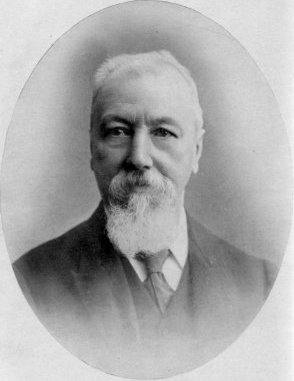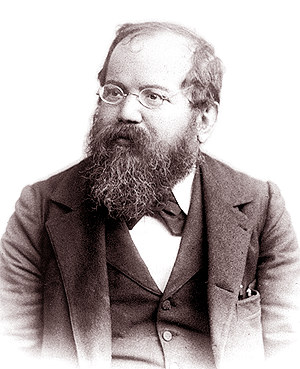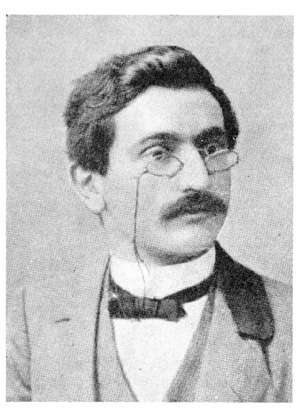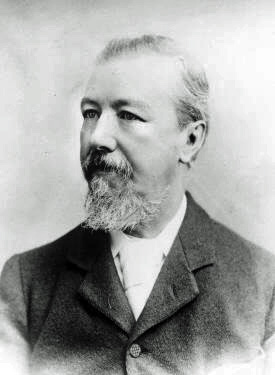Joseph Henry Blackburne facts for kids
Quick facts for kids
Joseph Henry Blackburne
|
|
|---|---|
 |
|
| Born | 10 December 1841 Manchester, England
|
| Died | 1 September 1924 (aged 82) London, England
|
| Nationality | British |
| Other names | "The Black Death" |
| Occupation | chess player |
| Years active | 1862–1914 |
Joseph Henry Blackburne (born December 10, 1841 – died September 1, 1924) was a famous British chess player. People called him "The Black Death" because of his strong play. He was the best player in Britain during the late 1800s.
Blackburne started playing chess when he was about 17 or 18 years old. This was quite late for a chess master! But he quickly became very good. He then became a professional chess player for over 50 years. At one point, he was one of the best players in the world. He won many tournaments. He also made chess popular by giving special shows. In these shows, he played many people at once (called simultaneous displays). He even played without looking at the board (called blindfold displays). Blackburne also wrote a book about his own chess games.
Contents
Biography
Joseph Henry Blackburne was born in Manchester, England, in December 1841.
He joined the Manchester Chess Club in 1861. At first, he lost to the best player in Manchester, Eduard Pindar. But soon after, Blackburne beat Pindar! By the next year, Blackburne was the champion of his city club. He even learned about chess endgames from another strong player, Bernhard Horwitz.
Blackburne learned about blindfold chess a bit later. In November 1861, a player named Louis Paulsen gave a blindfold show in Manchester. Paulsen beat Blackburne in that show. But soon, Blackburne was also playing chess blindfolded against three players at the same time!
Competitive Chess

Less than three years after learning chess, Blackburne joined the London 1862 chess tournament. This was the world's first "all-play-all" tournament, where everyone played everyone else. Blackburne even beat Wilhelm Steinitz in one game! Steinitz later became the first official World Chess Champion. Blackburne finished 9th in that tournament.
Back then, players used hourglasses to time their moves. Blackburne was the one who suggested using chess clocks instead! This trip to London made Blackburne lose his job back home. So, he decided to become a full-time professional chess player.
In 1869, he won the British championship. This made him England's best player. His first big international success was in a strong tournament in Baden-Baden in 1870. He finished third, behind famous players like Adolf Anderssen and Steinitz.
Blackburne was often among the world's top five players from 1871 to 1889. Other players like Steinitz and Emanuel Lasker were usually stronger. But Blackburne was still amazing! He stayed in the top 20 until 1902, when he was 61 years old. He played in many international tournaments, almost one every year. He often won high prizes.
His best results include:
- Sharing first place with Steinitz at Vienna 1873 chess tournament. This is where people nicknamed him "the Black Death".
- Winning in London 1876 with a score of 10 wins out of 11 games.
- Winning in Berlin 1881, three points ahead of his rival Johannes Zukertort.
He also came in second place in several other strong tournaments. His worst result during this time was 6th place in Vienna 1882. This was the only time all his main rivals finished ahead of him.

In the 1890s, Blackburne faced a new generation of players, like Emanuel Lasker. Lasker became the next World Champion. Blackburne didn't win as many tournaments then, but he still often finished ahead of many new stars. He also beat some players from his own generation.
Some chess experts believe Blackburne's best performances were his second-place finishes at Frankfurt 1887 and London 1892. In London 1892, he was only half a point behind Emanuel Lasker. Lasker himself thought Blackburne had more natural talent than Steinitz. However, Lasker felt Blackburne didn't have the same strong will or desire to work hard to become a world champion.
Blackburne's results in one-on-one matches were not as strong. He lost badly to Steinitz twice. But in 1862, Blackburne had only been playing chess for a few years. In 1876, Steinitz was playing at his very best. Emanuel Lasker also beat Blackburne in 1892. But Lasker also beat Steinitz very easily in their World Championship match. Blackburne also lost to Zukertort in 1881. However, Blackburne beat Zukertort in 1887 when Zukertort's health was not good.
The 1876 match against Steinitz was very important. It was the first time people had to pay to watch a chess match!
Exhibitions and Other Games
| This section uses algebraic notation to describe chess moves. |
After losing his job, Blackburne realized he was very good at blindfold chess. So, he started giving blindfold and simultaneous exhibitions all over Britain. For most of his career, he earned money from these shows. He could play up to twelve opponents at once without seeing the board! He even traveled to Australia in 1885 to give shows.
In 1889, the Teesside Chess Association paid Blackburne 9 guineas for two simultaneous shows and one blindfold event. This was a lot of money back then! Players paid a shilling to play him in a simultaneous game. They paid a half-crown to play him blindfolded. In his simultaneous games, he won 29, drew two, and lost only one. In blindfold games, he won seven and drew one, with no losses.
Blackburne also played for the British team in 11 cable matches against America. These matches started in 1896. In the first six matches, he had a good score against the top American player, Harry Pillsbury.
It's thought that Blackburne played 100,000 games in his career. This is more than almost any other professional chess player! He also found time to marry three times. He had a son named Julius with his second wife, Beatrice. He had another son named Frederick with his third wife, Mary.
There's a chess opening called the Blackburne Shilling Gambit (1.e4 e5 2.Nf3 Nc6 3.Bc4 Nd4?!). It's named after Blackburne because he supposedly used it to win quickly against amateur players. He would then win a shilling (a small amount of money) that they bet on the game.
Writings
In 1899, Blackburne published a book called Mr. Blackburne's Games at Chess. It was edited by P. Anderson Graham.
He also wrote two articles about chess for The Strand Magazine in 1906 and 1907. He explained many games for chess magazines. However, he never worked full-time as a chess writer for a newspaper or magazine.
Final Years
In 1914, when he was 72 years old, Blackburne won a special prize for a brilliant game against Aron Nimzowitsch. This was at the big St. Petersburg 1914 tournament. He didn't make it to the final stage of the tournament. That same year, he tied for first place in the British championship. But he was too sick to play the tie-breaking match. This was Blackburne's last major tournament. However, he was still giving simultaneous exhibitions in 1921.
His wife died in 1922. Joseph Henry Blackburne died from a heart attack on September 1, 1924. He was 82 years old. He is buried in the Brockley and Ladywell Cemeteries in Lewisham.
Legacy
Blackburne is known for his exciting and aggressive style of chess. This style is called Romantic chess. His big black beard and strong play earned him the nickname "der Schwarze Tod" ("the Black Death"). He got this name after his great performance in the 1873 Vienna tournament.
According to chess rankings, he was the second-best player in the world at different times between 1873 and 1889. He was especially good at endgames. He also had a great ability to combine moves to create winning attacks. This helped him win many "brilliancy prizes" for his amazing games. He was also very famous for his popular simultaneous and blindfold chess shows.
His book, Mr. Blackburne's Games at Chess, was published in 1899. It has recently been printed again. It contains over 400 of his games, about 20 chess puzzles he made, and a short story about his life.
A new book about him came out in 2015. It has over a thousand of his games and more than 50 puzzles. It also tells a detailed story of his life, family, and chess career.
Notable Games
Here are some of Blackburne's most famous games:
- Joseph Henry Blackburne vs. Jacques Schwarz, Berlin 1881. Wilhelm Steinitz, who wasn't Blackburne's friend, said White's plan in this game was "among the finest efforts of chess genius."
- Joseph Henry Blackburne vs. Samuel Lipschutz, New York 1889. In this game, Blackburne made a series of sacrifices that broke through his opponent's defenses.
- Emanuel Lasker vs. Joseph Henry Blackburne, London 1899. Blackburne, at 58 years old and playing with the black pieces, beat the reigning world champion.
Tournament Results
Here are some of Blackburne's results in chess tournaments:
| Date | Location | Place | Notes |
|---|---|---|---|
| 1862 | London International Tournament | 9= | Adolf Anderssen won; Blackburne shared last place. |
| 1867 | Dundee International Tournament | 5 | Behind Gustav Neumann, Wilhelm Steinitz, George Alcock MacDonnell and Cecil Valentine De Vere |
| 1869 | 2nd British Chess Championship | 1 | Beat De Vere in a play-off following tie. (Tournament began in late 1868.) |
| 1870 | Baden-Baden | 3= | Tied with Neumann; behind Adolf Anderssen and Steinitz; but ahead of Louis Paulsen, De Vere, Szymon Winawer, Samuel Rosenthal and Johannes von Minckwitz |
| 1872 | London | 2 | Behind Steinitz; ahead of Zukertort, MacDonnell and De Vere |
| 1873 | Vienna | 1= | Tied with Steinitz, who won both games of the playoff match This is where Blackburne was nicknamed "the Black Death". |
| 1876 | London | 1 | Ahead of Johannes Zukertort; Blackburne scored 10/11; this was just a month after Steinitz had whitewashed Blackburne 7–0 in a match. |
| 1878 | Paris | 3 | Behind Winawer and Zukertort |
| 1880 | Berlin | 1= | Tied with Berthold Englisch and Adolf Schwarz |
| 1881 | Berlin | 1 | 3 points ahead of Zukertort (2nd) |
| 1882 | Vienna | 6 | Behind Steinitz, Winawer, James Mason, Zukertort and George Henry Mackenzie |
| 1883 | London | 3 | Behind Zukertort and Steinitz; ahead of Mikhail Chigorin, Englisch, Mackenzie, Mason, Rosenthal, Winawer and Henry Edward Bird |
| 1885 | Hamburg | 2= | With Siegbert Tarrasch, Mason, Englisch and Max Weiss; behind Isidor Gunsberg; ahead of Mackenzie and 5 others. |
| 1887 | Frankfurt | 2= | With Weiss; behind Mackenzie; ahead of Curt von Bardeleben, Tarrasch and several others; Zukertort could only finish 14=. |
| 1889 | Breslau | 8= | With Mason; behind Tarrasch, Amos Burn, Jacques Mieses, von Bardeleben, Johann Bauer, Gunsberg, and Louis Paulsen. Ahead of Johann Berger, Emil Schallopp, Johannes Metger, Alexander Fritz, von Minckwitz, Semyon Alapin, Max Harmonist, Emanuel Schiffers and George H. D. Gossip. |
| 1889 | New York City | 4 | Behind Chigorin, Weiss and Gunsberg; ahead of Burn and 15 others. This tournament was extremely strong, as it was designed to select a challenger for Steinitz' title. |
| 1890 | Manchester | 2 | Behind Tarrasch; ahead of Mackenzie, Bird and Mason |
| 1892 | Belfast International Tournament | 1= | equal first with Mason |
| 1894 | Leipzig | 4 | Behind Tarrasch, Paul Lipke and Richard Teichmann; ahead of Carl August Walbrodt, Dawid Janowski, Georg Marco, Mieses and Carl Schlechter |
| 1895 | Hastings | 10 | Behind Harry Nelson Pillsbury, Chigorin, Emanuel Lasker, Tarrasch, Steinitz, Emanuel Schiffers, von Bardeleben, Teichmann and Schlechter; ahead of Walbrodt, Burn, Janowski, Mason, Bird, Gunsberg, Adolf Albin, Marco, William Pollock, Mieses, Samuel Tinsley and Beniamino Vergani. |
| 1896 | Nuremberg | 11 | Behind Em. Lasker, Géza Maróczy, Pillsbury, Tarrasch, Janowski, Steinitz, Walbrodt, Schiffers and Chigorin; ahead of Rudolf Charousek, Marco, Albin, Winawer, Jackson Showalter, Moritz Porges, Schallopp and Teichmann. |
| 1897 | Berlin | 3 | Behind Charousek and Walbrodt; ahead of Janowski, Burn, Alapin, Marco, Schlechter, Caro, Chigorin, Schiffers, Metger, Winawer, Wilhelm Cohn, Hugo Suechting, Teichmann, Englisch, Adolf Zinkl, Albin and von Bardeleben. |
| 1898 | Vienna | 11 | Behind Tarrasch, Pillsbury, Janowski, Steinitz, Schlechter, Chigorin, Burn, Lipke, Maroczy and Simon Alapin; ahead of Schiffers, Marco, Showalter, Walbrodt, Halprin, Horatio Caro, David Graham Baird and Trenchard. |
| 1899 | London | 6 | Behind Em. Lasker, Janowski, Maroczy, Pillsbury and Schlechter; ahead of Chigorin, Showalter, Mason, W. Cohn, Steinitz, Lee, Bird, Tinsley and Teichmann (who withdrew after 4 games due to illness). Blackburne, as Black, beat Lasker; this was the first time a British player had defeated a reigning world champion. |
| 1904 | Hastings (British Championship) | 3 | |
| 1907 | (British Championship) | 2= | |
| 1910 | (British Championship) | 2= | |
| 1913 | (British Championship) | 3 | |
| 1914 | St. Petersburg | --- | Blackburne did not qualify for the 5-player final stage, in which the placings were: 1 Em. Lasker; 2 José Raúl Capablanca; 3 Alexander Alekhine; 4 Tarrasch; 5 Frank Marshall. At 3.5/10, Blackburne had the 4th-5th best score of the 6 players who did not qualify for the finals – behind Ossip Bernstein, Akiba Rubinstein, and Aron Nimzowitsch; tied with Janowski; and ahead of Gunsberg. Won a Special Brilliancy Prize for his win over Nimzowitsch. |
| 1914 | (British Championship) | 1= | Tied with Frederick Yates; this was Blackburne's last international tournament; he was 72. |
Match Results
Here are Blackburne's results in one-on-one matches against other players:
- Under score, + means games won, = means games drawn (tied), − means games lost.
| Date | Opponent | Result | Location | Score | Notes | |
|---|---|---|---|---|---|---|
| 1862-63 | Wilhelm Steinitz | Lost | London | 2/10 | +1−7=2 | Only two years after Blackburne started playing chess. |
| 1876 | Wilhelm Steinitz | Lost | London | 0/7 | +0−7=0 | |
| 1881 | Johannes Zukertort | Lost | London | 4½/14 | +2−7=5 | |
| 1881 | Isidor Gunsberg | Won | London | 8½/14 | +7−4=3 | |
| 1887 | Zukertort | Won | London | 9½/5½ | +5−1=7 | Zukertort's health and play declined rapidly after he lost the 1886 World Championship match to Steinitz. |
| 1887 | Gunsberg | Lost | Bradford | ½/5 | +0−4=1 | In 1890 Gunsberg gave Steinitz a good fight in a world title match (Steinitz won by +6−4=9). |
| 1891 | Celso Golmayo Zúpide | Won | Havana | 6/10 | +5−3=2 | |
| 1891 | Vasquez | Won | Havana | 5½/6 | +5−0=1 | |
| 1892 | Emanuel Lasker | Lost | ?? | 2/10 | +0−6=4 | |
| 1895 | Curt von Bardeleben | Drew | London | 4½/9 | +3−3=3 | |
See also
 In Spanish: Joseph Henry Blackburne para niños
In Spanish: Joseph Henry Blackburne para niños
 | Jackie Robinson |
 | Jack Johnson |
 | Althea Gibson |
 | Arthur Ashe |
 | Muhammad Ali |


